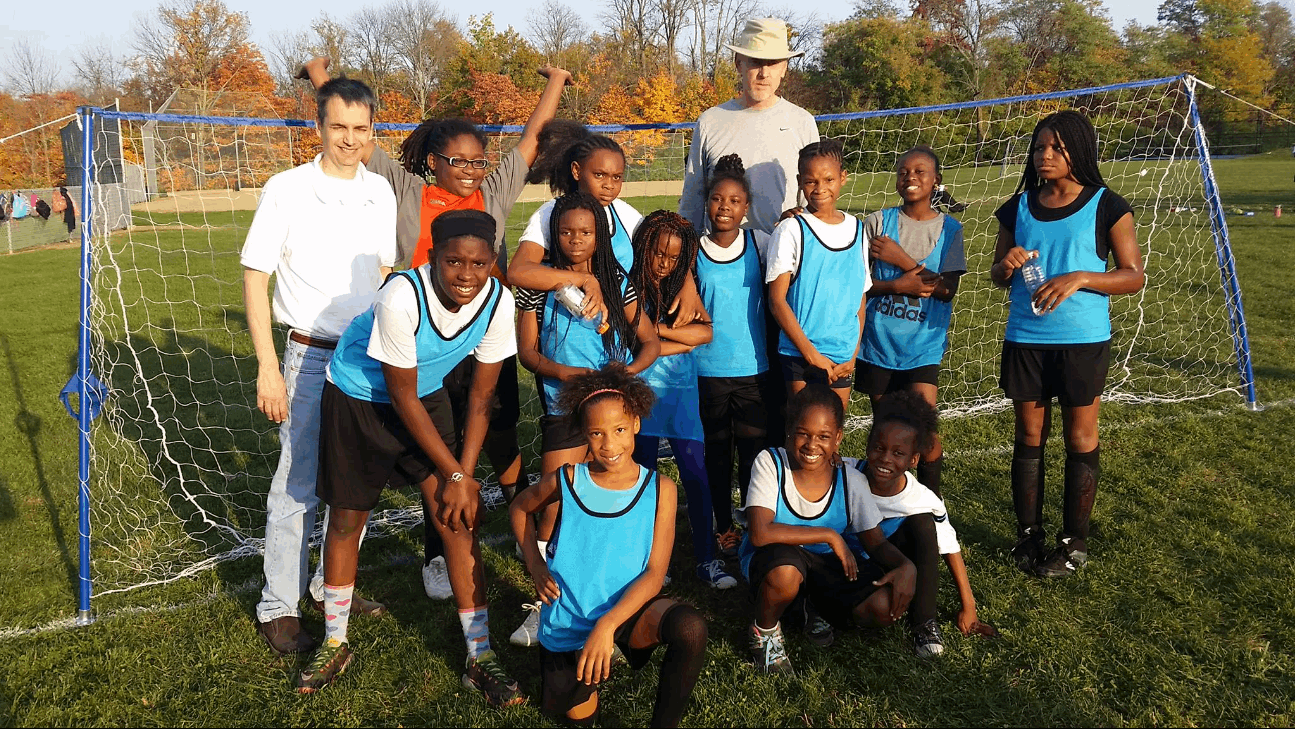
Pleasant Hill Academy Soccer
The following essay is from our Personal Stories of Repair series, which provides examples of ordinary individuals investing their lives to undo the impact of structural racism in our local communities. You can find more of these stories at https://www.embracingracialunity.org/about/module-5
Two high school girls and I founded a soccer program for girls in grades 2-6 at Pleasant Hill Academy in College Hill (Cincinnati). The school had failing grades and was just five minutes from my home and church. The student population was 90% black or mixed race, 5% Hispanic, and only 4% white. Ohio offered vouchers for parents to send their children to private schools due to the failing state of Pleasant Hill Academy. This resulted in middle-class white families buying homes in College Hill and sending their children elsewhere for schooling. The students attending the school were disproportionately poor and disproportionately disadvantaged. I had participated in Wiz Kids, an effective reading and mentoring program at the school, but as a former youth soccer coach, I felt God was nudging me to address the lack of access these students had to playing soccer.
In Cincinnati, young girls have a unique opportunity to play soccer, but not all communities have equal access. Unfortunately, the Pleasant Hill Academy families, predominantly led by single parents, struggle to make recreational leagues work. This is a common problem in majority black schools within the Cincinnati Public School system. Due to the lack of participation from elementary school students, there aren’t enough soccer players to support high school teams in some schools. This is a stark contrast to economically challenged single mothers living in white school districts who have options to enter their daughters in soccer programs within the community.
Playing soccer had blessed my own daughters and their teammates and my vision was to give these girls that same opportunity to play soccer. However, finding scrimmage partners was our first major obstacle. Rec teams had little incentive to scrimmage once their season started and we couldn’t recruit girls until after school started in the fall and the rec leagues were already in full swing. The school connected us with a sponsor that was launching a similar program at 18 Cincinnati Public schools. I had access to a church van, which allowed me to drive the girls to scrimmages without burdening their parents. I called each of the coaches and pleaded with them to play us. I remember that first year another coach saying, “this is our first year. Can we wait until next year to scrimmage?” Ultimately, we found creative ways to give the girls playing experience.
I recruited others to help me. Together we developed relationships with these girls, shaped their character and brought them into the church, witnessing multiple hearts being given to Christ. However, I was reminded of the importance of not stopping there. In the early 1800s, many American Christians committed themselves to evangelizing the slaves without fighting for their freedom. As Christians, we must hunger and thirst to put things right, following the example of repair provided in The Parable of the Good Samaritan. For me, putting things right includes addressing the inequities that prevent Black children from accessing the same opportunities as my own children.
Looking back, it’s clear that the impact we made was far greater than we could have imagined. The lives transformed the most were ours. I'm grateful that my youngest daughter joined me in this journey and was inspired to become a school teacher targeting schools in disadvantaged communities. And I found that this act of repair transformed my own heart, helped me reprogram my gut and confront my own racial bias.
